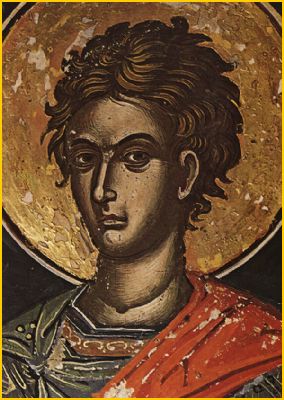|
|||
|---|---|---|---|
| This weekly bulletin insert complements the curriculum published by the Department of Christian Education of the Orthodox Church in America. This and many other Christian Education resources are available at http://dce.oca.org. | |||

The Church celebrates the memory of Saint Nestor of Thessalonica. He was a young student of the Greatmartyr Demetrius. Saint Nestor's story gives insight into a gruesome aspect of Roman imperial power. Many Roman rulers, in this case the emperor Maximian, displayed the cruelty that frequently comes with having absolute control over others' lives. Maximian sponsored lavish public festivals in the arena. His favorite gladiator was Lyaeus, who was strong, big, and notoriously vicious. A feature of the festivals was Lyaeus' challenge to fight anyone willing to come forward. As he killed more and more men, the number of those offering to fight him dwindled. Both Maximian and Lyaeus enjoyed not just the gladiator's victories, but horrible deaths for those he vanqushed. The two didn't want to give up their sport, so the emperor began compelling rather than inviting men to fight Lyaeus. Christians were among the first to be pitted against him in large numbers. Maximian had already imprisoned Saint Demetrios, the inspiring leader of the Christians. Now he began forcing one after another of Demetrios' fellow believers to face Lyaeus on a specially-built terrace over the arena. There the powerful gladiator would fight and maim them, and then throw them off the terrace onto rows of upright spears to die in agony, a procedure the emperor himself had invented to delight the crowds. Saint Nestor was not physically imposing. But knowing what was happening in the arena day after day, he felt called to take action. He visited Saint Demetrios in prison, and received a blessing to confront Lyaeus on that deadly terrace. Nestor managed to kill Lyaeus, and because many in the crowd knew that the victor was Demetrios' disciple, a shout of "Great is the God of Demetrios!" went up. But the emperor had been humiliated. He ordered Nestor's immediate beheading, and had Demetrios executed. For a saint to ask and receive another saint's blessing to kill a man seems a strange departure from the Church's teachings. One of the hymns of praise to Nestor gives us a way to understand this: it says that he was "given power from above, like David against Goliath."
Luke 11: 21-22 gives us a way of thinking about this. In these verses Jesus Christ answers those who accuse him of casting out demons by the prince of demons. He says, "When a strong man, fully armed, guards his own palace, his goods are in peace; but when one stronger than he assails him and overcomes him, he takes away his armor in which he trusted, and divides his spoil." Maximian was "fully armed" and able to guard his palace and goods. But Nestor had stronger armor, and used it to defeat Maximian and "divide his spoil" by interrupting his enjoyment of wanton murder. Nestor, Demetrios and Lyaeus lost their earthly lives. But perhaps they gave Maximian a chance to gain back his soul. |
|||
